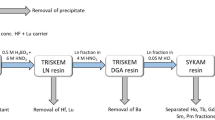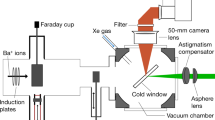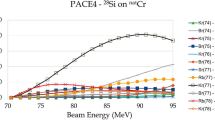Abstract
THE isotope Ba139 is radioactive with a half-life of 85 min. decaying to La139 by β- emission. This activity was first reported by Pool and Cork1. Kalbfell and Cooley2, using absorption methods, have reported a continuous β-spectrum with a maximum energy of 1 MeV. accompanied by γ-radiation of energy 0.6 MeV., while Born and Seelmann-Eggebert3 report a maximum β-energy of 2·3 MeV. also by an absorption method.
This is a preview of subscription content, access via your institution
Access options
Subscribe to this journal
Receive 51 print issues and online access
$199.00 per year
only $3.90 per issue
Buy this article
- Purchase on Springer Link
- Instant access to full article PDF
Prices may be subject to local taxes which are calculated during checkout
Similar content being viewed by others
References
Pool, M. L., and Cork, J. M., Phys. Rev., 51, 1010 (1937).
Kalbfell, D. C., and Cooley, R. A., Phys. Rev., 58, 91 (1940).
Born, H. T., and Seelmann-Eggebert, W., Naturwiss., 31, 210 (1943).
Author information
Authors and Affiliations
Rights and permissions
About this article
Cite this article
SHEPHERD, L., HILL, J. Decay of Barium-139. Nature 162, 566–567 (1948). https://doi.org/10.1038/162566b0
Issue Date:
DOI: https://doi.org/10.1038/162566b0
Comments
By submitting a comment you agree to abide by our Terms and Community Guidelines. If you find something abusive or that does not comply with our terms or guidelines please flag it as inappropriate.



